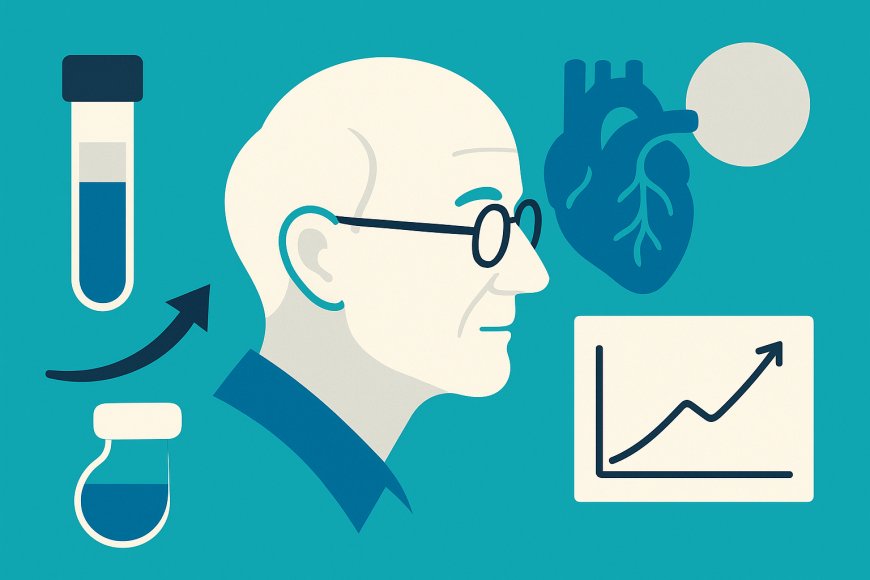Organ Aging and Plasma Proteomics: A New Frontier in Longevity Science
This article explores recent advances in plasma proteomics for estimating organ-specific biological age, predicting chronic disease risk, and redefining healthspan.

In a landmark study published in Nature, titled “Plasma Proteomics Links Brain and Immune System Aging with Healthspan and Longevity,” researchers employed high-throughput plasma proteomics to estimate the biological age of 13 vital organs. They then correlated these organ-specific age gaps with the risk of 15 major chronic diseases and all-cause mortality across a longitudinal follow-up of up to 17 years. This study represents a major leap in geroscience, offering a novel molecular lens through which to view the internal progression of aging.
Biological Age vs. Chronological Age
Chronological age alone is a blunt instrument for assessing health risks. This study reframes aging as a heterogeneous and organ-specific phenomenon, where the true state of aging lies not in years lived, but in the functional decline—visible at the molecular level—of distinct organs. Two individuals of the same chronological age may differ significantly in the biological ages of their heart, brain, or kidneys, resulting in radically different trajectories for disease and longevity.
Organ-Specific Risks and Predictive Power
Among the most compelling findings:
-
A one standard deviation increase in the biological age of the heart was associated with a 1.83-fold increased risk of heart failure.
-
Brain aging emerged as the most powerful predictor of Alzheimer’s disease, with a hazard ratio (HR) of 1.91, independent of other organ age gaps.
-
Aging of the kidneys and pancreas was significantly associated with a higher risk of chronic kidney disease (CKD).
-
Lung aging was linked to a 39% elevated risk of developing chronic obstructive pulmonary disease (COPD).
These findings underscore the organ-specific pathways through which biological aging accelerates vulnerability to disease.
The Protective Power of Youthful Organs
Conversely, individuals with biologically younger organs—regardless of chronological age—displayed markedly lower disease risks. Notably:
-
A younger brain offered substantial protection against dementia and cognitive decline.
-
A biologically youthful intestine was associated with a 70% lower risk of developing type 2 diabetes (HR = 0.30).
These insights affirm that preserving organ youth is a powerful buffer against chronic illness.
Lifestyle and Educational Determinants of Organ Aging
The study also shed light on the modifiable factors influencing organ age:
-
Positive lifestyle factors—including regular physical activity, oily fish intake, and higher educational attainment—were associated with decelerated organ aging.
-
Negative exposures—such as tobacco use, alcohol consumption, inadequate sleep, and diets high in processed meats—correlated with accelerated aging in multiple organs.
This reinforces the growing consensus that daily choices exert measurable influence on biological aging.
Medications and Supplements: Potential Modulators of Internal Aging
Of the 137 commonly used medications and supplements evaluated, six were significantly associated with slowed biological aging in specific organs:
-
Premarin (Conjugated Estrogen)
-
Ibuprofen
-
Glucosamine
-
Cod Liver Oil
-
Multivitamins
-
Vitamin C
These compounds showed protective effects particularly for the brain, pancreas, and kidneys—organs most susceptible to age-related functional decline. Notably, estrogen therapy appeared especially effective in slowing immune, hepatic, and vascular aging in women with early menopause, highlighting the importance of hormonal status in biological aging dynamics.
Mortality Risk and the Biological Signature of Longevity
The most profound revelation from the study was the strong predictive power of biological brain and immune system age for all-cause mortality:
-
Each standard deviation increase in the brain age gap was associated with a 59% higher risk of death (HR = 1.59).
This aligns with previous findings in model organisms where the brain serves as a central regulator of systemic aging, influencing inflammation, endocrine balance, and cross-organ health. Advanced aging in the brain not only increased risk for neurological conditions but also predicted elevated risk of cardiac failure and COPD, reflecting its integrative role in whole-body homeostasis.
Conclusion: A Modifiable Map of Internal Time
This study firmly establishes that aging is not a uniform or irreversible fate, but a measurable, organ-specific, and modifiable biological process. By using plasma proteomics to monitor organ age, clinicians and researchers can move beyond symptom-based models and toward early detection and prevention.
The results also offer a compelling public health message: Healthspan can be extended—not merely by medical intervention, but through proactive lifestyle choices, equitable education, and personalized care strategies. As science advances toward therapies targeting biological aging, the foundation remains within reach: the food we eat, the steps we take, the knowledge we seek, and the environments we shape.
What's Your Reaction?










































































































